Guess what? Our partner Forum Virium Helsinki (FVH) recently organised two successful Open Day events to promote the Helsinki Starring Living Lab, focusing on urban logistics and microhub development.
On 3 May 2024, the first Open Day event centred on discussing and developing the concept of microhubs in Helsinki. It attracted 37 participants, including various stakeholders. Helleke Heikkinen from the Hanken School of Economics presented the global micro hub concepts, while DHL Express shared their experiences with city hubs both in Finland and across the globe. FVH introduced the DISCO project and its goals related to microhubs. The event concluded with a workshop that helped stakeholders collaboratively identify needs, wishes, challenges, and demands for a microhub network in Helsinki.
This event produced initial drafts outlining the needs, wishes, locations, services, and challenges of microhubs in dense urban environments. It provided valuable insights from various stakeholders, including cities, retailers, food delivery companies, logistics operators, universities, and software providers. These results will inform the Helsinki Living Lab’s service design work, led by Ramboll Finland, to develop business and operational models for different types of microhubs.
The second event, held on May 28, 2024, drew 38 participants and focused on the DISCO project, its objectives, and the established microhub in Ruoholahti, Helsinki. FVH presented the project’s activities and goals and facilitated discussions on DISCOCURB and DISCOPROXI activities. Attendees also visited the Ruoholahti micro hub, where they explored its services and experienced the logistics technologies in action, including Cargo bikes from A2B and DB Schenker and LMAD logistics robots.
This event highlighted the DISCOCURB activities, leading to discussions with potential service providers and establishing connections for future communication and procurement. The site visit to the micro hub garnered significant interest, resulting in multiple planned future visits by logistics companies and universities.
Feedback from both events was overwhelmingly positive, with stakeholders expressing a strong interest in continuing collaborative efforts to develop city logistics. The main conclusion is that there is a clear need to organize more multi-stakeholder events in the autumn of 2024. The Helsinki Living Lab plans to engage city planners and decision-makers further and continue discussions on microhubs and other DISCO-X solutions to reduce logistics-related emissions in Helsinki.
The events revealed a gap in understanding between private and public stakeholders regarding the role and benefits of micropubs. However, the Open Days also effectively facilitated crucial discussions, underscoring the importance of strategic planning for city logistics solutions. Moving forward, the Helsinki Living Lab aims to bring stakeholders together more frequently to jointly address logistics issues. Collaborating with the Mobility Lab Helsinki project, the Helsinki Living Lab will continue this event series in autumn 2024 to foster ongoing dialogue and collaboration.
DISCO has been bustling this spring and summer, actively engaging in numerous forums on mobility and sustainable freight to highlight our pioneering project. Here’s a quick recap of our recent activities!
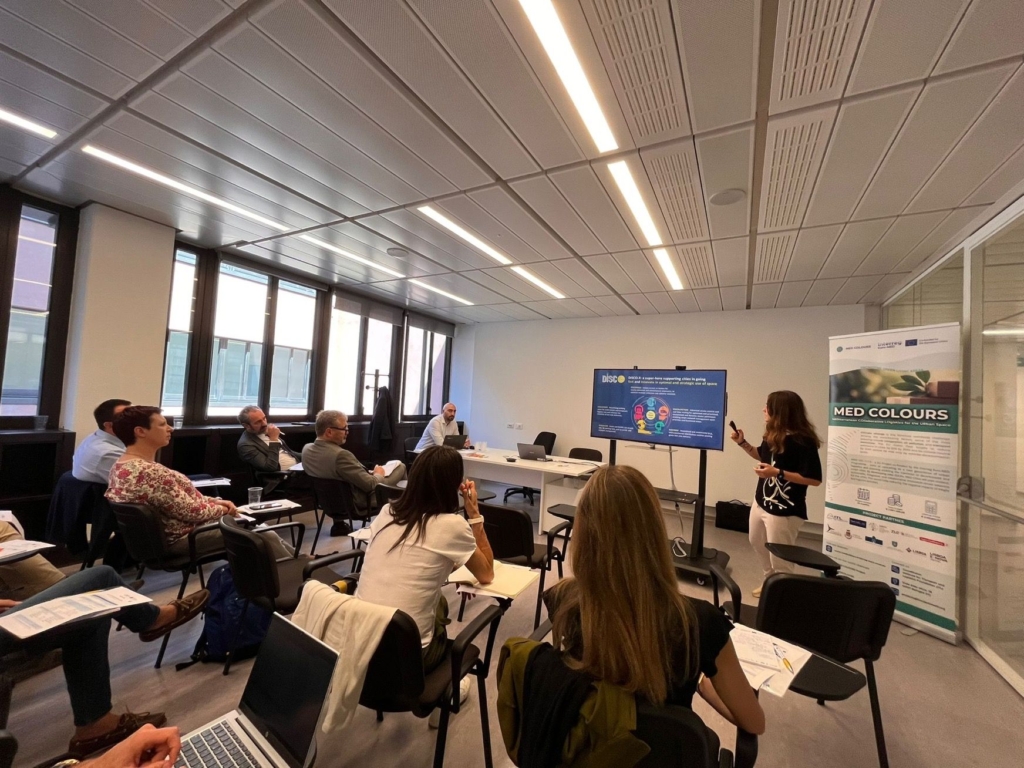
There is always a good opportunity to talk about DISCO! On 5 June 2024, Paola Astegiano, DISCO Project Manager, was in Bologna at the meeting of a fellow European project: MED COLOURS!
The goal? To develop synergies and share experiences, best practices, visions and strategies for more efficient data-driven urban logistics. Indeed, funded by the Interreg Euro-MED Programme and part of the Interreg Euro-MED Green Living Areas Mission, MED COLOURS is also working to enable the transition to decarbonised and smart cities with more sustainable urban logistics
We look forward to fostering more collaboration with fellow EU projects for a new, collective future of sustainable logistics!
On 30 and 31 May 2024, in Florence, Italy, the fourth Edition of the PDAYS 2024 took place, an event dedicated to the themes of parking and urban space management organised by AIPARK Associazione Italiana Operatori Sosta e Mobilità.
On Friday 31 May, Matteo Banfi from the DISCO Twinning Living Lab Padua presented the city’s successful experiences, being selected among the 100 Mission cities, the project’s only Italian Living Lab and an example of excellence in urban logistics management since the European MOSCO project.
On 24 April 2024, our Project Coordinator Paola Cossu joined LINKS Foundation’s workshop on ‘Sustainable urban logistics: innovative solutions and planning strategies. Organised with UPS and DISCO project lead FIT Consulting srl in honour of #PlanetWeek2024, the event went all-in on sustainable logistics, presenting innovative EU projects like ours and our twin UNCHAIN Project!
The objective of the workshop was indeed to present an overview of the most innovative solutions to meet the current challenges of hashtag urban logistics, fostering dialogue and knowledge sharing. An objective that was successfully achieved thanks also to the presentation of other interesting national and international initiatives, such as #ToMove, which explores autonomous mobility solutions, and UNCHAIN, which focused on improving logistics processes in the urban context by fostering information sharing between actors.
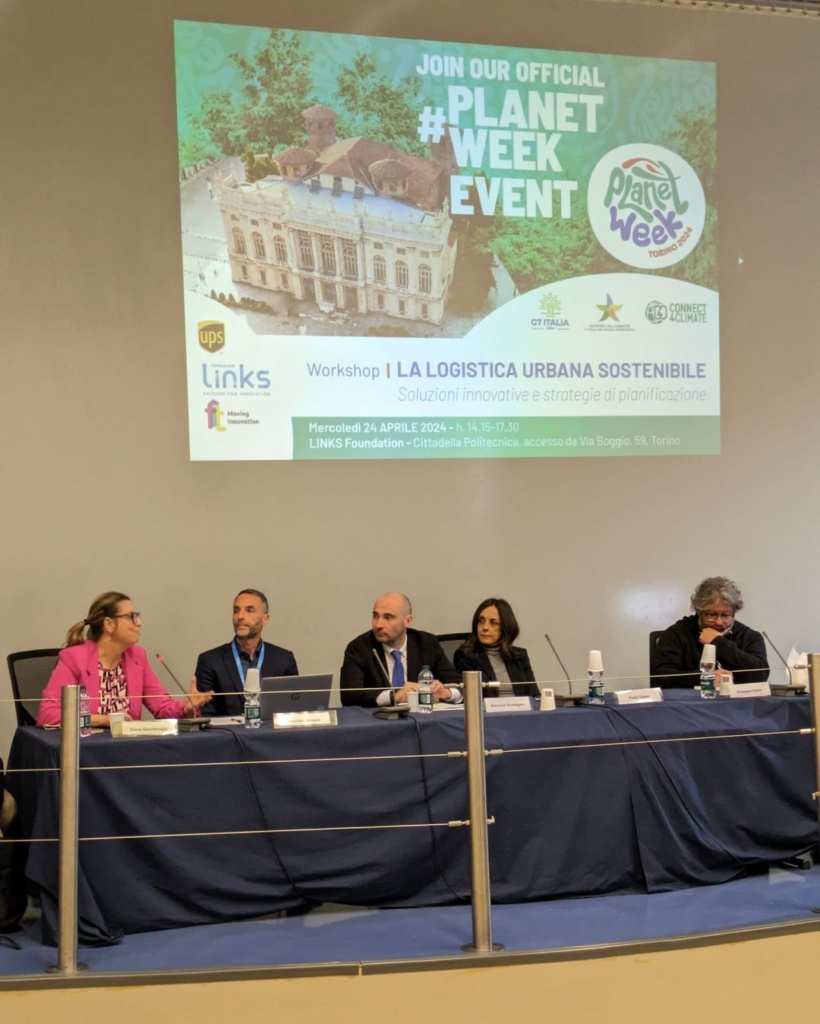
The first webinar of the POLIS – ALICE webinar series 2024 focused on Physical-Internet (PI) innovation, and has been jointly organised by the DISCO and URBANE projects. The webinar has been facilitated by Paola Cossu, with contributions from Bart Lannoo (BE-Mobile) from the DISCO project and Alice Benini (Institute for Transport and Logistics, ITL) from the URBANE project, highlighting the common work of the two projects implementing in real scenarios PI concepts in Bologna and Belgium.
DISCO was featured also at Intertraffic Amsterdam, which took place between 16 -19 April 2024 in the Netherlands. Intertraffic is one of the world’s leading business and stakeholder gathering on smart mobility, infrastructure, traffic management, road safety and parking.
On 16 April 2024, a session on “The Battle for Urban Space: How to Organize the Kerb in Inner Cities?”, organized by European Parking Association and moderated by Theo Thuis, Chair of the EPA Scientific Committee, supported by FIT Consulting and POLIS. The stage was shared with Laurence A. Bannerman, Bart Lannoo and Wouter van de Wiele (BE-Mobile) spoke, Iskandar Tange from Coding the Curbs.
The session discussed the vision on how to set up urban access control, with a focus on logistics and including lessons learned from DISCO.
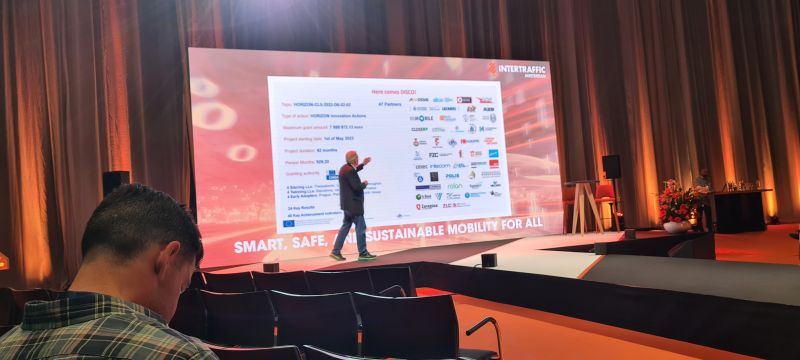
DISCO also got to attend the Data Spaces Symposium in Darmstadt! Our Coordinator Paola Cossu attended Vertical 2, “Data Spaces for Mobility, Tourism, and Cities: How are data spaces transforming our lives?” presenting DISCO’s work on Mobility of People and Goods applications.
The Data Spaces Symposium is the world’s leading event on data spaces, and this year’s edition was a great success. The 2024 edition in Frankfurt showcased ready-to-market solutions and use cases, demonstrating advanced steps in data spaces applications.
Explore the future of urban logistics with the innovative DISCO Knowledge Hub! This freely accessible digital platform serves as an interactive online resource for urban logistics and sustainable mobility, offering a comprehensive array of tools, resources, and collaboration opportunities. Tailored for policymakers, practitioners, entrepreneurs, and operators within and beyond DISCO partners, the Knowledge Hub integrates essential components of urban logistics and involves diverse stakeholders to enhance scalability and impact.
Key features of the platform include an Urban Logistics Best Practices & Resources Repository, insights from DISCO’s Living Labs, funding information and guidance, and strategies for scalability and replication. These elements are hosted on the ALICE platform, ensuring seamless integration and interoperability beyond the DISCO project’s lifetime.
For capacity-building and training activities, such as webinars, e-courses, and networking opportunities, users are directed to the Mobility Academy (mobility-academy.eu). This specialized platform provides extensive training resources designed to empower stakeholders with the skills and knowledge necessary to drive positive change in urban logistics.
The DISCO Knowledge Hub is designed to foster innovation, collaboration, and sustainable urban mobility. By providing a centralized repository of information and a vibrant community space for networking and knowledge exchange, it empowers stakeholders to drive positive change in urban logistics.
Join us in shaping the smart, sustainable cities of tomorrow. Access the DISCO Knowledge Hub Course: DISCO Knowledge Hub | Knowledge Platform & ALICE members Intranet (etp-logistics.eu)
But that is not all! We plan on further unlocking the future of urban logistics with our cutting-edge DISCO Training Programme. Designed to empower DISCO Living Labs with the skills and knowledge they need, this programme is a comprehensive roadmap for planning, developing, implementing, and scaling innovative urban logistic solutions. By participating, local and national policymakers, practitioners, entrepreneurs, and operators will gain invaluable insights and practical skills to support the transition towards decarbonized and digital cities. The DISCO project’s training initiatives will ensure that every stakeholder is equipped to navigate the ever-evolving landscape of urban logistics, utilizing a Physical Internet (PI) – led approach to revolutionize urban planning and logistics.
Our training covers critical themes such as data spaces, physical internet, urban space reallocation, digitalization, SUMP, SULP, transition processes, Key Performance Indicators (KPIs) and more. By addressing these pivotal topics, the programme aims to foster long-lasting capacities and capabilities across all levels of governance and operations. With the use of various training formats, such as webinars, e-courses and podcasts, which will be hosted in Mobility Academy (mobility-academy.eu), we ensure that the training needs of DISCO Living Labs are met. This holistic approach not only builds a strong foundation for learning but also extends beyond DISCO Living Labs, inviting anyone interested in enhancing their understanding and expertise in urban logistics.
Join us in this transformative journey and become a key player in the smart, sustainable cities of tomorrow – stay tuned for more info!
DISCO was featured at Transport Research Arena (TRA), which took place on 15-18 April 2024 in Dublin, Ireland! TRA is the largest European research and technology conference on transport and mobility. This year’s theme was “Transport Transitions: Advancing Sustainable and Inclusive Mobility”.
Paola Cossu featured DISCO in the Special Session titled “Innovation in Urban Logistics: Public and Private Sectors Thriving Together“, co-organised by POLIS, ALICE and ECTRI. The session aimed to share successful experiences and lessons learnt in urban logistics from EU-funded R&I projects and create a common vision of using innovative solutions for zero-emission urban freight transport. Inputs and discussions with other EU-funded such as DECARBOMILE, GREEN-LOG, URBANE, and UNCHAIN.
Moreover, Paola Astegiano (FIT) presented DISCO at the poster session dedicated to logistics and sustainable transport.
Finally, DISCO was featured during the entire duration of the conference with a booth shared with URBANE at the ETP-ALICE Innovation Village, along with other relevant EU-funded projects focusing on urban freight and logistics.
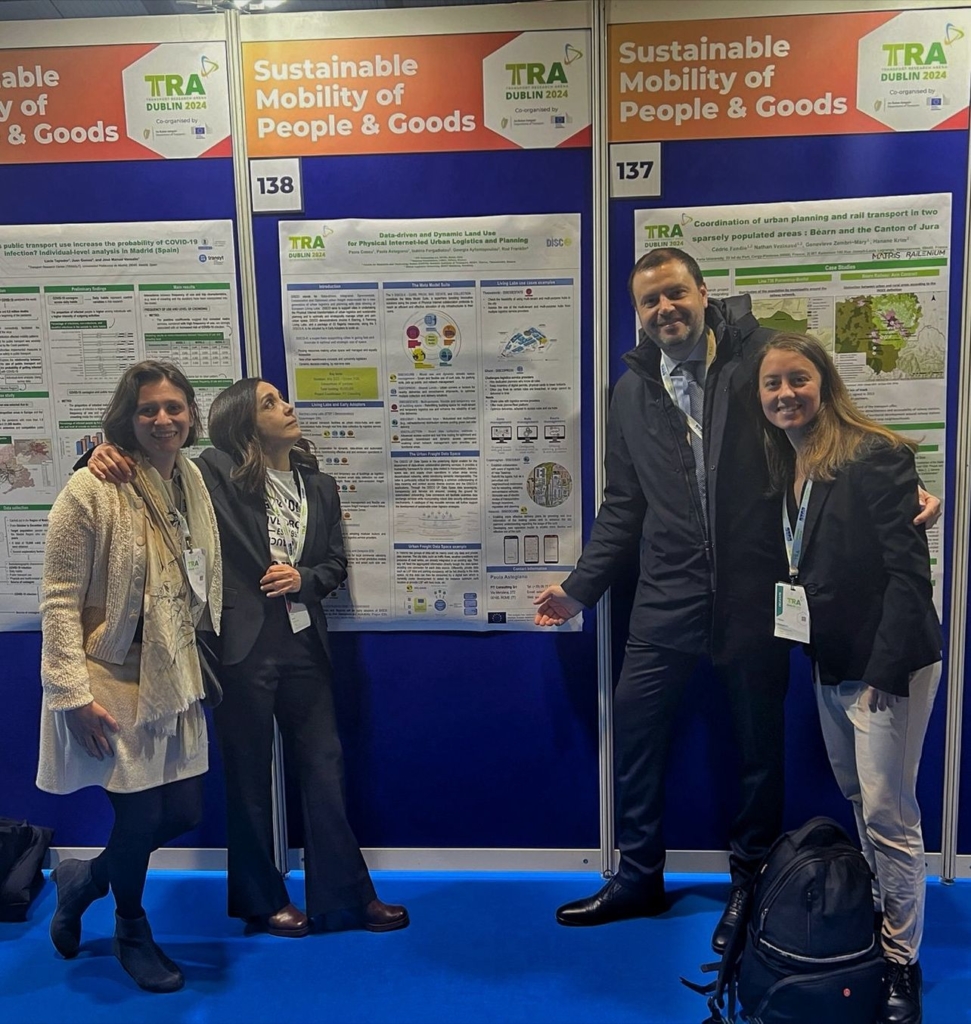
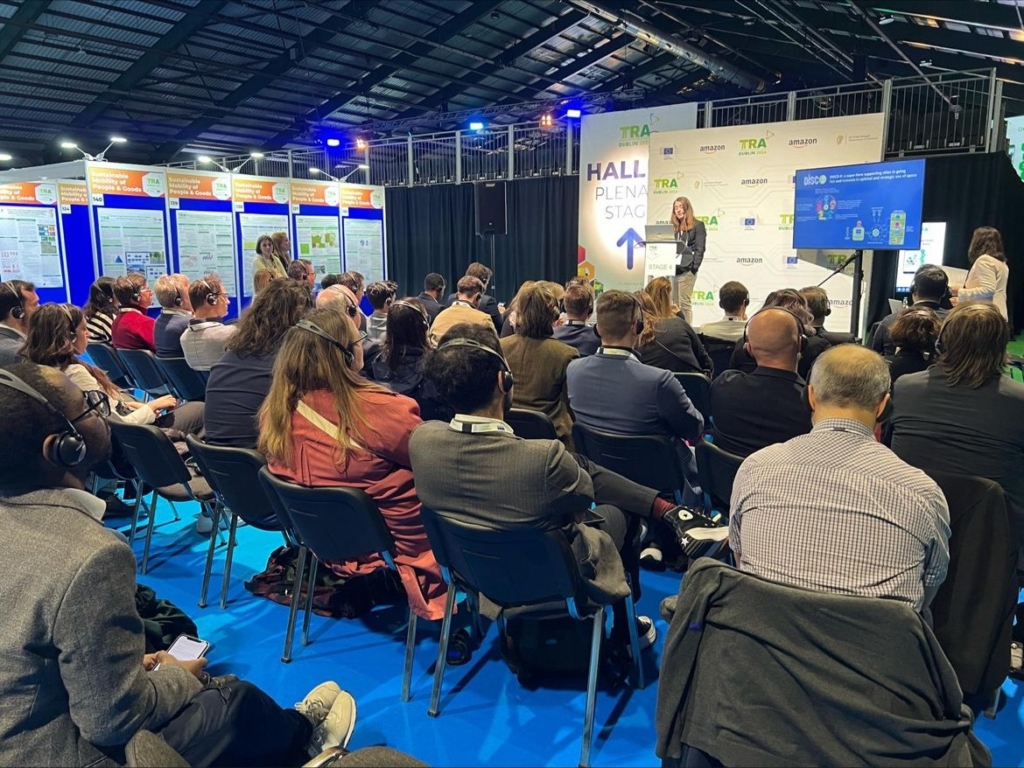
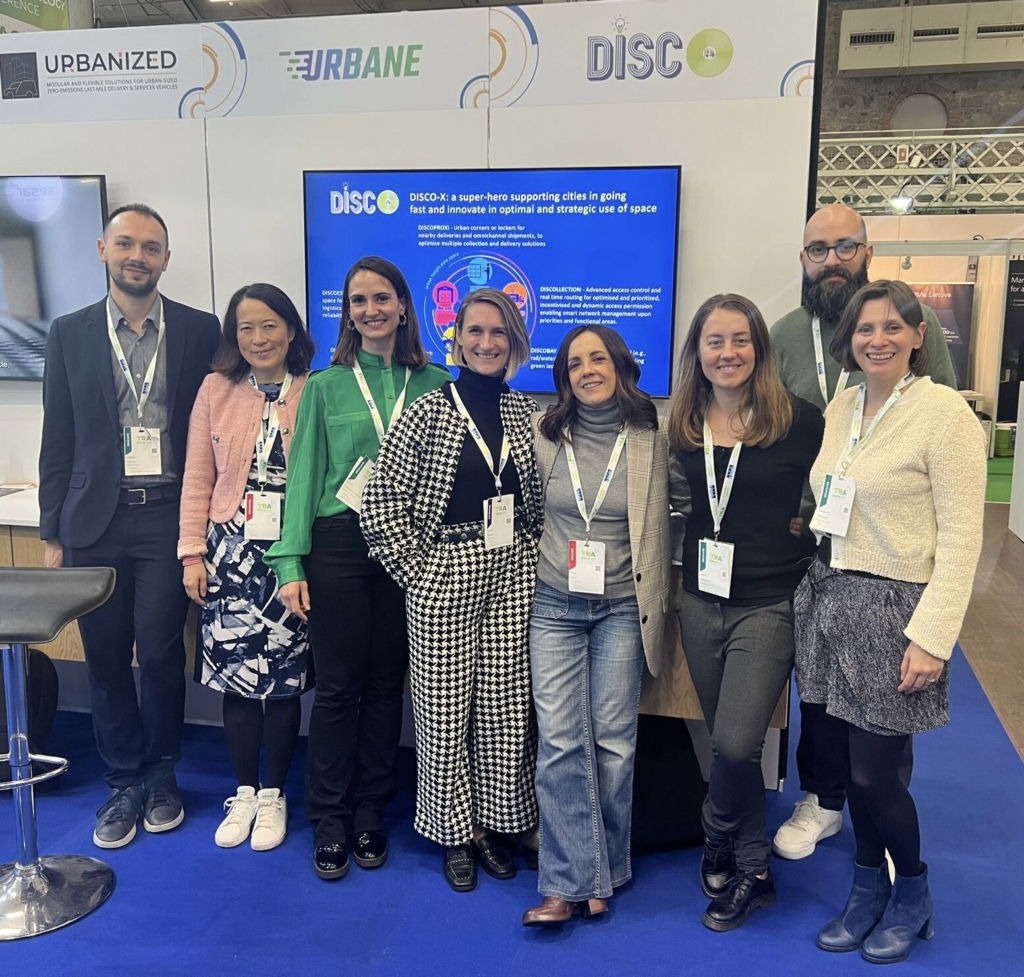
The second edition of the Urban Logistics Innovation Day took place on Tuesday, 4 June, in Brussels. The event, co-organised by POLIS and the European Technology Platform (ETP) ALICE, and proudly supported by the DISCO project.
The Urban Logistics Innovation Day is intended to become a yearly fixed appointment in the urban mobility agenda, following the first edition held on 27 September 2023 as the final event of the EU-funded project LEAD.
The format of the second edition was filled in with presentations, interactive sessions, ideas, thought-provoking inputs and exchanges between local authorities, logistic service providers, industry representatives and academics from 10 EU countries. The event aimed to:
Some of the main takeaways: the rapid development of new modes of last-mile delivery in the urban landscape leads to an interest in the opportunities arising from connected or even hyperconnected city logistics. The rise of circular economies holds potential for urban logistics, as previously split flows of waste and production may become increasingly connected, challenging import models. Last but not least, the importance of collaboration between all actors, urban space management, data sharing and technological innovation that will deliver benefits for cities, people and businesses.
Moderated by Yanying Li and Marion Cottet (ALICE), Raffaele Vergnani (POLIS), the event featured presentations and contributions by Paola Cossu (FIT), Ioanna Fergadiotou (INLECOM), Tom Antonissen (EPA), Bart Lannoo (BE-Mobile).
All presentations are available HERE.


DISCO Starring Living Lab Helsinki is conducting zero-emission deliveries at its new smart logistics centre. Coordinated by the City of Helsinki’s innovation company Forum Virium Helsinki, the city is developing and testing this solution for the flexible use of underutilised urban space for urban logistics in the Ruoholahti neighbourhood. The pilot also involved the EU URBANE project for last-mile solutions and the partner companies A2B, DB Schenker, DHL Express, LMAD (Last-mile Autonomous Delivery) and Rolan.
At the Ruoholahti Shopping Center, a local distribution centre opened last week. A cargo bike or a kind little robot may carry packages to all locals, and anybody can send or pick up packages from the DHL Express service point there!

NeRo (No emissions Robot) and HeRo (Helsinki Robot). Photo: Vesa Laitinen
The distribution centre’s goal is to lessen the amount of loud cars in downtown Helsinki. Large vans are used to transport the project partner DB Schenker’s supplies to the nearby distribution centre. Packages are distributed among LMAD autonomous delivery robots, electric delivery vehicles, and A2B and DB Schenker cargo bikes in the centre. Rolan, a company offering services for smart transportation and logistics, is one of the project partners. Their job is to fix and recharge shared electric scooters and bicycles at the local distribution centre. According to research, people in Helsinki want customer service locations, eco-friendly delivery, and flexible service.
Reducing the number of loud cars in central Helsinki is the goal of the distribution centre. Big vans transport DB Schenker, a project partner, supplies to the nearby distribution centre. Packages are distributed among electric delivery vans, LMAD autonomous delivery robots, and A2B and DB Schenker cargo bikes in the centre. Rolan, a supplier of smart transportation and logistics services, is one of the project partners. They are responsible for maintaining and charging the shared electric scooters and bicycles at the local distribution centre.
“Our surveys have shown that Helsinki residents are hoping for flexible service, eco-friendly deliveries and customer service points. We are aiming to meet these needs with the local distribution centre,”
Matias Oikari, Project Manager, Forum Virium Helsinki
The goal of the pilot project is to determine how a multi-service local distribution centre may work as a link in the logistics chain in a densely populated area and how it might support environmentally friendly delivery options for deliveries inside cities, particularly those headed toward downtown Helsinki.
“The pilot’s operating model does not only make package deliveries more efficient and reduce unnecessary driving, but it also reduces emissions by replacing conventional vans with eco-friendlier alternatives. As the non-profit innovation company of the City of Helsinki, we want to promote cooperation between various operators to achieve emissions reductions,”
Matias Oikari, Project Manager, Forum Virium Helsinki
The talking Helsinki Robot HeRo), which was tested in the Ruoholahti and Jätkäsaari districts in December 2023, will now be joined by the smaller NeRo (No emissions Robot). Autonomous robots are like mobile parcel lockers. With the robots’ help, those living near the distribution centre can have their packages delivered close to home throughout the summer.
Watch a short video explainer by clicking the image above.
Why is last-mile logistics in Helsinki so special? Managing the local distribution centre requires facilitating cooperation amongst the many parties. Forum Virium Helsinki, the non-profit innovation corporation of the City of Helsinki, serves as an impartial intermediary, guaranteeing that all parties involved will safely exchange their data and get equitable advantages from the EU Horizon-funded facilities. In addition to giving businesses a chance to test out new services, Forum Virium will improve resident service quality and—most importantly—help Helsinki successfully execute its city strategy and meet its carbon neutrality goals. It is difficult to bring the main logistical service providers under one roof because of global red tape, business-specific regulations, and privacy concerns – however, once these problems are resolved, Forum Virium’s work will improve resource efficiency and help decarbonize urban logistics in a number of ways, such as by consolidating packages and reducing the number of vehicles in the city centre.
Based on the resident survey done in collaboration with the students from Hanken School of Economics in Helsinki, it became evident that the majority of the residents in Helsinki are curious about novel innovations, such as autonomous delivery vehicles, and willing to try them out at least once. Approximately 83% of the respondents have used parcel locker systems to pick up their parcels and more than half of them are extremely satisfied with the service. The latest autonomous delivery vehicles are providing the same service but with another layer of convenience when the customer can choose the one hour time slot and location based on their own preferences. That’s why the last-mile logistics innovations are expected to be vastly popular in Helsinki. More information Watch a short video of the centre and robots & download photos (Photos: Vesa Laitinen, Videos: Flux Productions) The pilot project will run until the end of August. Media representatives can book a guided tour of the centre, bikes and robots by contacting the persons listed below. The local distribution centre (microhub) is located on the pedestrian deck of Ruoholahti Shopping Centre, at the address: Itämerenkatu 21, Helsinki. The local distribution centre is open to customers during the opening hours of the DHL Express customer service desk, Monday–Friday 10.30 AM – 5.30 PM.
For more information, please contact Matias Oikari, Project Manager, Forum Virium Helsinki, +358 40 664 8877, matias.oikari@forumvirium.fi
The recent Open Day in our Starring Living Lab Ghent marked a significant milestone for the DISCO project, attracting substantial interest from participants keen on the Lab’s developments. Hosted on 5 June 2024, the event showcased the promising Urban Access Controller, highlighting its potential to streamline transport planning by integrating access rules and regulations into planning tools. This innovation drew particular attention from city representatives eager to optimize logistics flows and adapt rules based on the insights provided by the platform.
The day’s proceedings began with the City of Ghent presenting its logistics plans, followed by a keynote from Laura Tavernier of Rebel. Tavernier’s presentation on calculating logistics flows in Flemish cities underscored the holistic approach of the Ghent Living Lab, which encompasses all types of logistics flows rather than focusing on a single domain such as e-commerce.
Participants were then introduced to the DISCO project and the Urban Access Controller, after which they engaged in interactive brainstorming workshops. One workshop focused on data retrieval, discussing the necessary data and conditions under which companies are willing to share it. The other workshop centred on collaboration with sustainable last-mile logistics providers. Both workshops yielded fruitful outcomes, emphasizing the need for tangible benefits for all stakeholders to foster collaboration.
The Open Day concluded with Bart Vannieuwenhuyse from Tri-Vizor sharing his vision of a collaborative model in city logistics, incorporating many principles of the DISCO project and the Physical Internet.
The event, attended by 35 participants, provided a platform for networking and establishing connections for future collaborations. As the day wrapped up, participants stayed for drinks, paving the way for follow-up conversations and potential testing partnerships. This autumn, the Ghent Living Lab will escalate its activities, with the platform going live and demonstrating its capabilities in real-life conditions in the inner city of Ghent. This upcoming phase promises to be an exciting development to watch – stay tuned for more information!
On 11 April 2024, the Hellenic Institute of Transport, part of the Centre for Research and Technology Hellas (CERTH), which is leading the Thessaloniki’s Starring Living Lab, celebrated a major milestone: they successfully hosted a dynamic Bootcamp event as part of their work in DISCO! This initiative brought together city residents and key stakeholders in urban freight transport to explore and discuss cutting-edge measures and future proposals for revolutionizing Thessaloniki’s urban logistics.
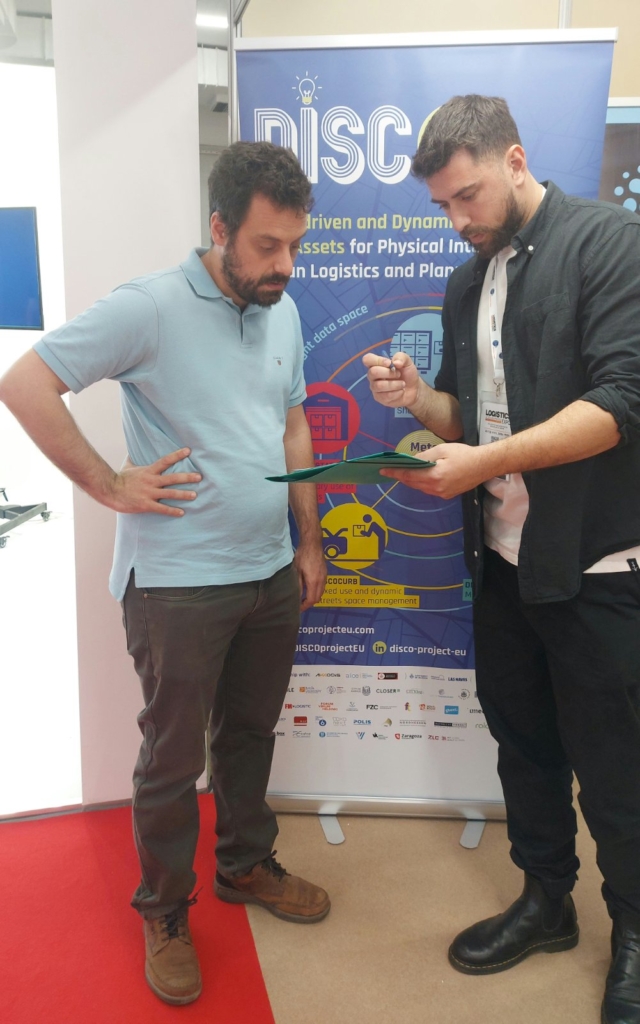
The Bootcamp served a dual purpose: it featured insightful presentations on the latest innovations in city logistics and engaged citizens in a crucial survey research effort. Attendees were invited to evaluate the environmental impact and efficiency of specific urban logistics measures currently being implemented.
The survey findings will be instrumental not only for the DISCO project but also for ensuring the broad acceptance and success of sustainable, eco-friendly logistics solutions in Thessaloniki. The active participation of the community underscores the importance of collaborative efforts in transforming urban logistics and achieving a greener, more efficient cityscape.
Stay tuned for more updates!
On 22-23 April 2024, the Municipality of Thessaloniki opened its doors to the DISCO consortium for our latest General Assembly. Partners gathered for two intense days of fruitful discussions on the project’s progress, as we continue steadfast towards the Physical Internet transformation of urban logistics.
The first day kicked off with a welcome speech from the City of Thessaloniki’s Deputy Mayor, Mr Athanasios Ziogas, setting a tone of mutual collaboration and progress and emphasizing the commitment of public authorities for more sustainable urban logistics.
The meeting then proceeded with discussions of various critical aspects, including a DISCO progress overview and brainstorming sessions within specific work packages. DISCO’s Starring Living Labs, composed of Copenhagen, Ghent, Thessaloniki, and Helsinki, provided exciting updates on their respective activities: in Ghent, efforts have been focused on optimizing data sharing between cities, logistics service providers, and green last-mile service providers. Copenhagen reported significant progress in partnership agreements and digital twin development, while Thessaloniki highlighted advancements in urban logistics real estate databases and citizen engagement through the hosting of a DISCO Citizens Bootcamp. Finally, Helsinki showcased developments in micro hub implementation and service design discussions.
The second day continued with further enriching discussions, featuring the presentation of the DISCO Knowledge Hub, an open-source digital platform designed to serve as a collaborative online space offering a range of resources, tools, and opportunities for knowledge sharing, capacity building, innovation, and collaboration. Updates were also provided on liaison efforts and the institution of the Impact Creation Board For Transformation (ICBT), which will feature planned expert involvement and collaborative initiatives for the project.
The meeting wrapped up with an exciting site visit to the Thessaloniki Living Lab, where partners got to visit the TIF-HELEXPO Exhibition Centre which is being optimised into a flexible logistics hub. The consortium also got to visit the Centre for Research and Technology Hellas (CERTH), where they learned more about the Mobility Living Lab being hosted within CERTH.
The site visit was split into two parts:
Overall, the meeting highlighted the consortium’s ongoing commitment to work together for a new generation of sustainable urban logistics. Stay tuned as we reveal more of DISCO’s progress in the next months!
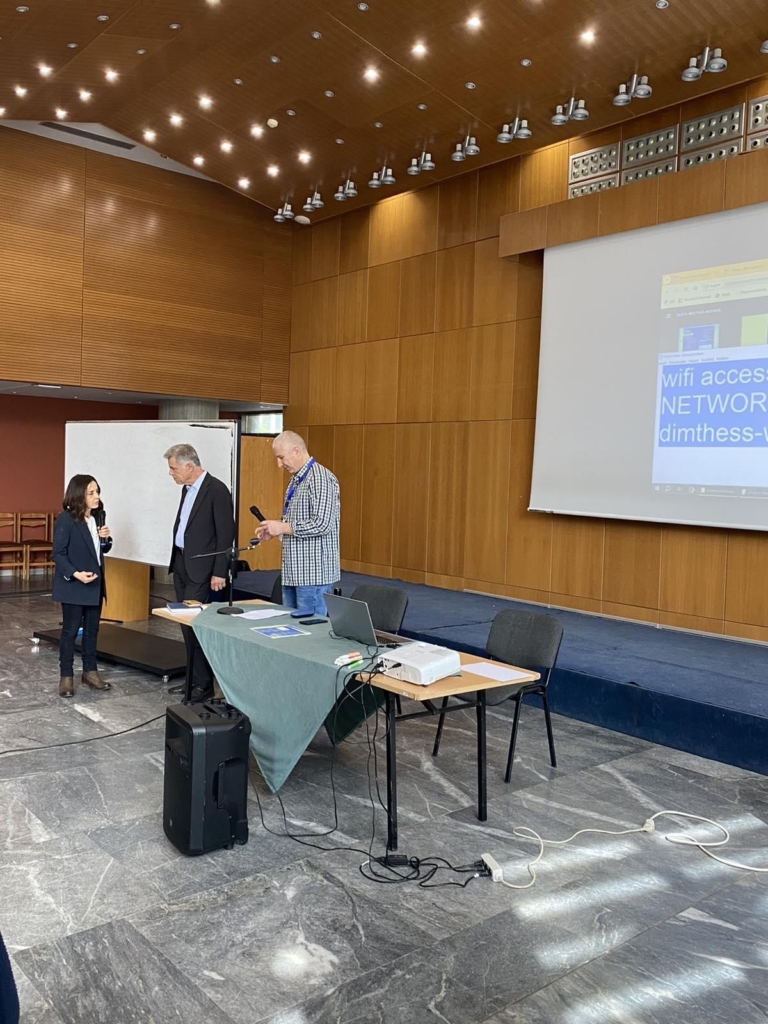
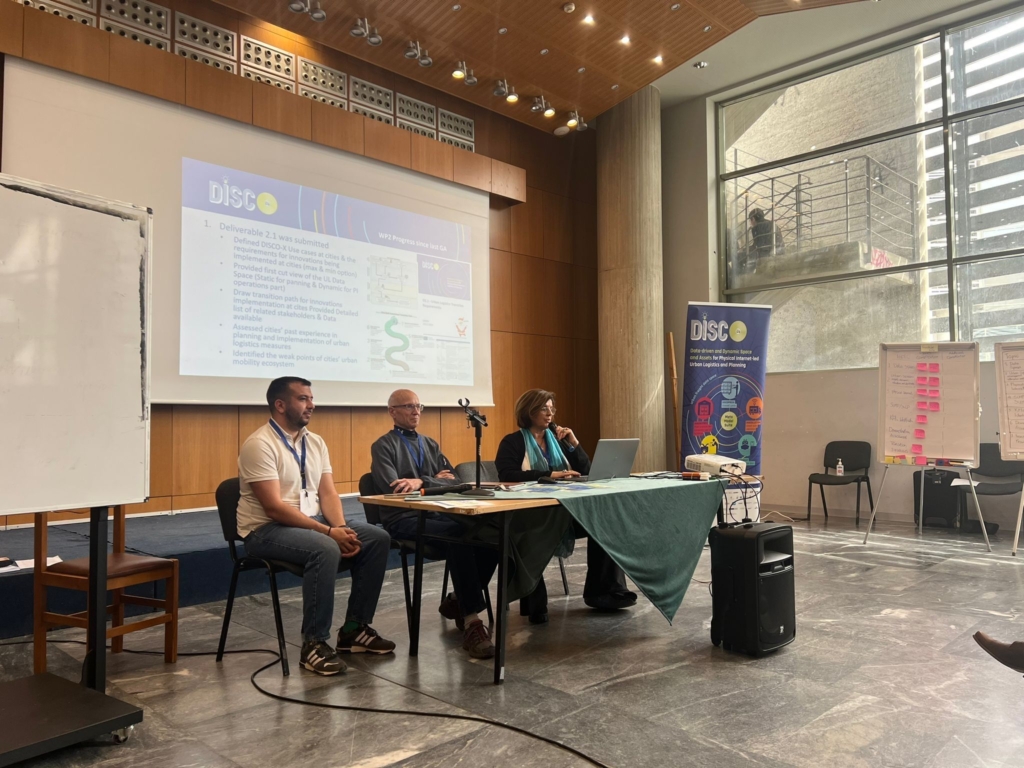
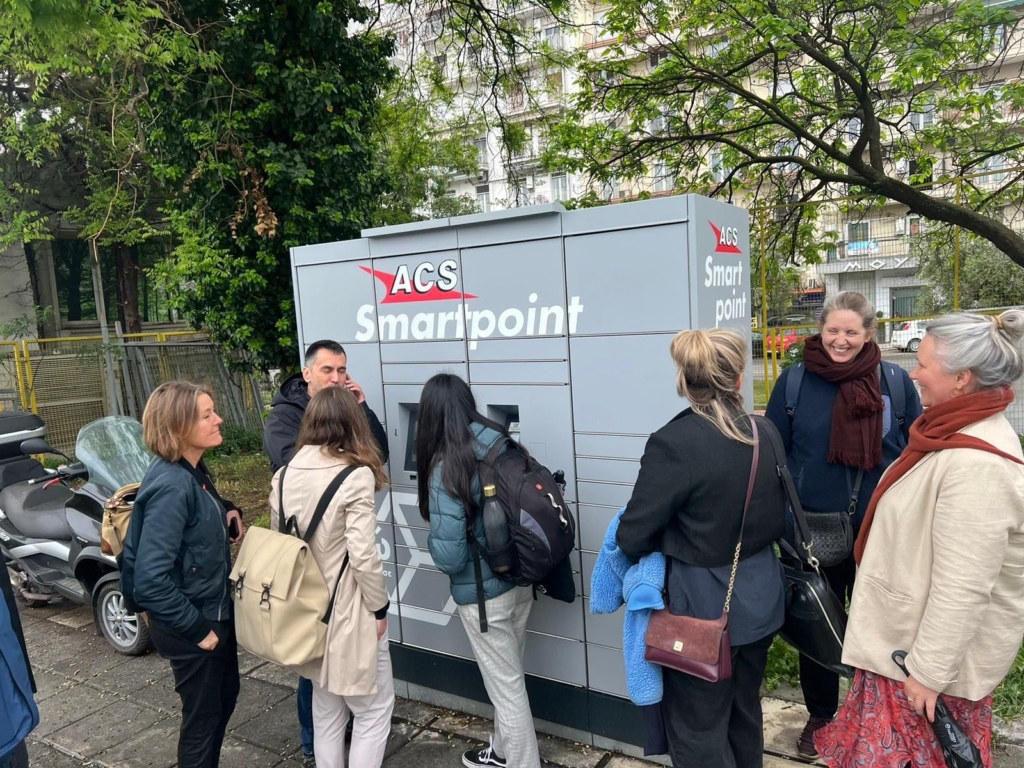
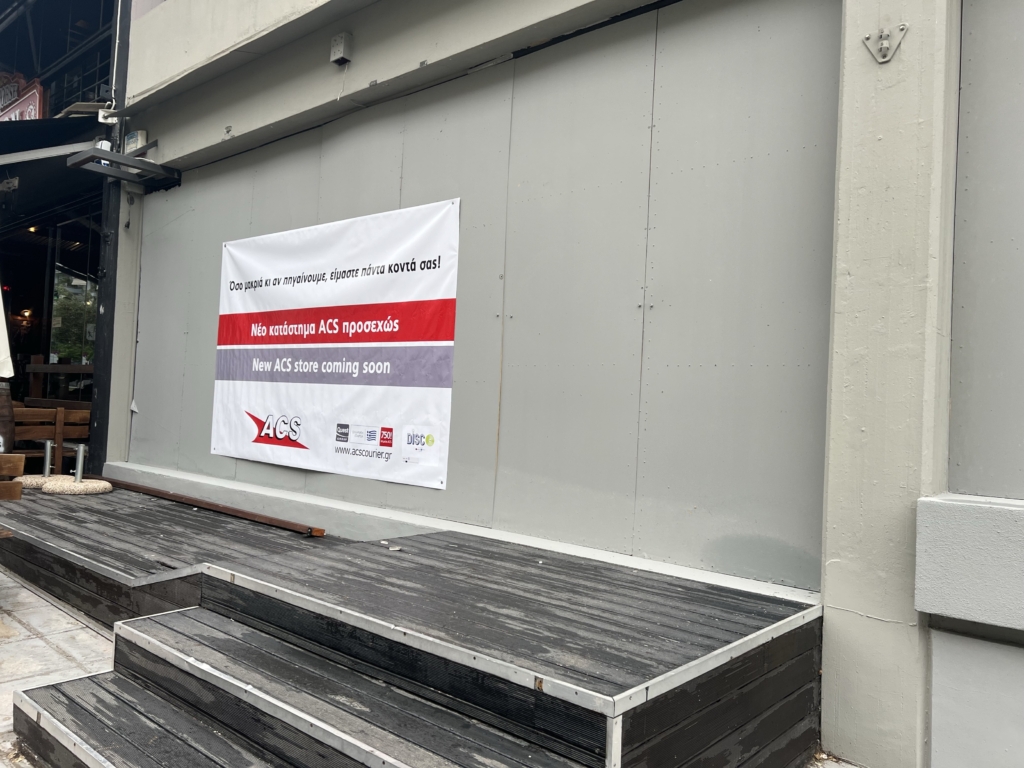

That’s right! Copenhagen, one of DISCO’s Starring Living Labs, convened over 50 stakeholders from the urban logistics sector for an exciting event: on 3 April 2024, the City hosted its very first DISCO Open Day, showcasing its mission to collaboratively engineer solutions for urban logistics in Copenhagen and the Capital Region, steering towards a sustainable transport ecosystem.
The spotlight shone on the Digital Twin technology, a pivotal tool showcased by IRT SystemX. Through sophisticated simulations, stakeholders glimpsed potential transformations: shifts in driving patterns, the integration of MicroHubs, and the advent of Off-Hour Deliveries.
These simulations aren’t just visionary; they’re actionable insights driving tangible change. As the day unfolded, discussions delved deep into the logistics landscape, fueled by a shared commitment to sustainability. The collaboration between stakeholders and the embrace of cutting-edge technology underscored a collective dedication to shaping a greener, more efficient future for urban logistics.
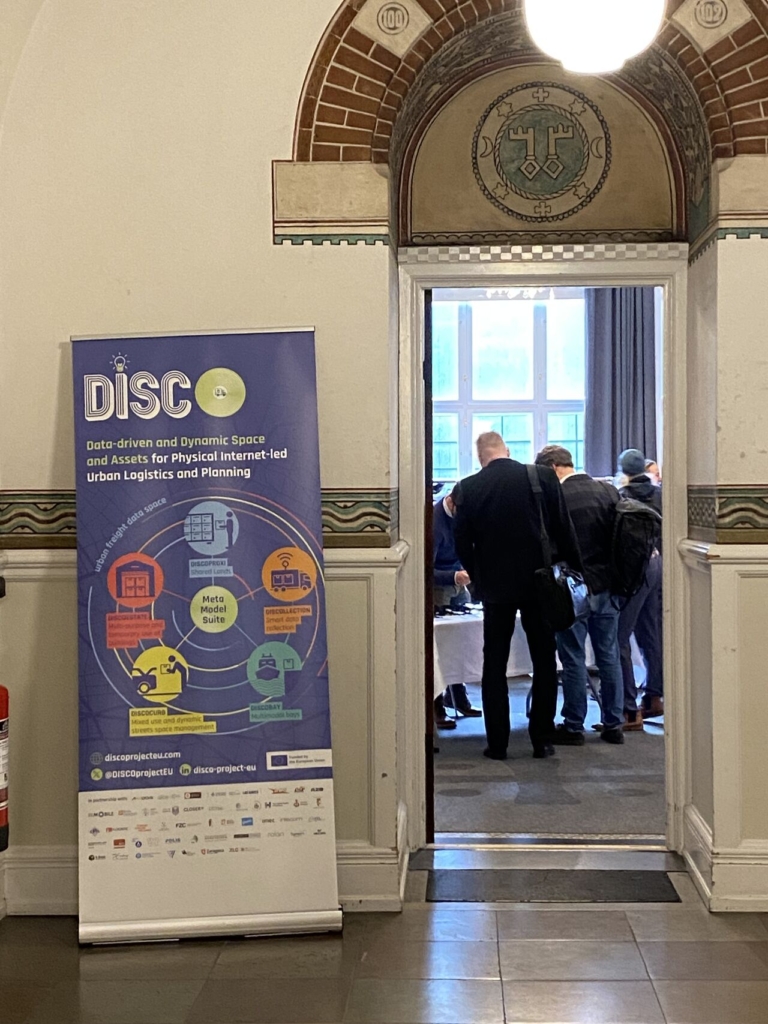
Congratulations to the Copenhagen Living Lab team for successfully conducting such an inspiring event! Stay tuned as we reveal more of our Living Labs as they go through their journey towards sustainable urban logistics.